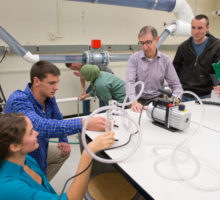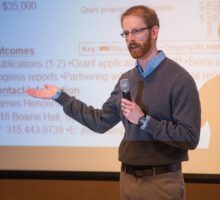As announced in guide notice NOT-OD-19-015, the National Institutes of Health (NIH) has changed its approach to how it uses the R15 activity code. The current AREA Parent Announcement, PA-18-504, expires after January 7, 2019.
Research enhancement opportunities will now be split between two distinct programs:
- Academic Research Enhancement Awards (AREA) will be reserved for grants to undergraduate-focused institutions that do not receive substantial funding from NIH; and
- Research Enhancement Award Program (REAP) that will support graduate schools of arts and sciences and health professional schools that grant baccalaureate or advanced degrees.
As background, the goals of the R15 program are to support meritorious research, expose students to research, and strengthen the research environment of an institution.
It is important to note that each funding opportunity announcement includes detailed program-specific eligibility information that supersedes any general information listed here.
Eligibility for the Academic Research Enhancement Award (AREA) program for undergraduate-focused institutions requires that:
- The applicant institution must be an accredited public or non-profit private school that grants baccalaureate degrees in biomedical sciences.
- At the time of application submission, all the non-health professional components of the institution together have not received support from the NIH totaling more than $6 million per year (in both direct and F&A/indirect costs) in 4 of the last 7 federal fiscal years.*
- A signed letter is required from the Provost or similar official with institution-wide responsibility verifying the eligibility of the applicant institution at the time of application submission. The Office of Sponsored Programs (OSP) will coordinate with the Office of the Provost to obtain the signed letter.
Organization eligibility for the Research Enhancement Award Program (REAP) program for graduate schools and health professional schools require that:
- The applicant organization must be an accredited public or non-profit private school that grants baccalaureate or advanced degrees in health professions or advanced degrees in biomedical and behavioral sciences.
- At the time of application submission, the applicant institution (all components) may not have received support from the NIH totaling more than $6 million per year (in both direct and F&A/indirect costs) in 4 of the last 7 federal fiscal years.*
- A signed letter is required from the Provost or similar official with institution-wide responsibility verifying the eligibility of the applicant institution at the time of application submission. The Office of Sponsored Programs (OSP) will coordinate with the Office of the Provost to obtain the signed letter.
*For both AREA and REAP program eligibility, please note that all activity codes are included in the eligibility calculations except the following: C06, S10, and all activity codes starting with a G.
Syracuse University currently meets the eligibility requirements for both the AREA and REAP programs, however specific program announcements/solicitations from NIH institutes/centers may have additional requirements/limitations so it is important to ensure that you read these documents carefully. Questions regarding eligibility may also be directed to the Office of Sponsored Programs.





